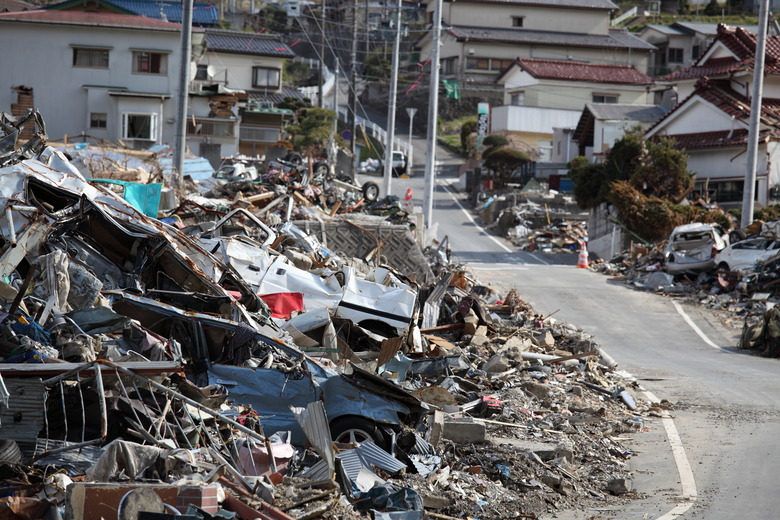How Do Tsunamis Affect Human Lives?
Tsunamis are massive waves generated by a displacement of water and can have disastrous effects on people. Earthquakes or underwater explosions can trigger these waves, such as those caused by volcanic activity or underwater testing of nuclear devices. Tsunamis can travel at over 500 mph in deep water and can reach 1,700 feet in height at their most extreme.
TL;DR (Too Long; Didn't Read)
Tsunamis can have a devastating effect on human lives. They can destroy homes, change landscapes, hurt economies, spread disease and kill people.
Devastation of Homes
Devastation of Homes
Tsunamis can destroy entire buildings and can cause serious property damage. Many individuals who live in an area hit by a tsunami lose everything they own, which leaves them homeless and without resources in the initial aftermath. Some of the tsunami effects include leveling homes down to their foundations and exposing bedrock. The rebuilding process is expensive, time-consuming and psychologically tumultuous for people.
Loss of Life
Loss of Life
Tsunami dangers are difficult to detect far out at sea, since waves do not begin to gain size until they reach shallower waters. As a result, they strike with very little warning, often resulting in a huge loss of human life. The tsunami that struck northern Japan after an offshore earthquake on March 11, 2011, killed at least 14,340 people, which crushed buildings and left thousands trapped under debris or pulled out to sea.
Damage to the Economy
Damage to the Economy
Daily life for individuals in a nation affected by a tsunami changes because of the damage the disaster causes to the economy. Locations that were previously popular destinations for visitors suffer depression as a result of lost tourism, with people staying away out of fear and during reconstruction. Rebuilding after a tsunami puts a significant financial strain on governments as well, resulting in an economic downturn that can affect entire regions of the world.
Disease and Contamination
Disease and Contamination
After a tsunami, contaminated water and food supplies pose a risk to people's health. Flood waters can carry many sources of contamination such as dirt or oil. In addition, infectious diseases increase after a tsunami. Malaria and cholera may become more common. People may have to stay in shelters or other close quarters that make spreading diseases easier.
Other Health Effects
Other Health Effects
Tsunamis can lead to other devastating health consequences. People may have traumatic injuries from the destruction of property and landscapes. Many people may suffer from broken bones or brain injuries. The loss of normal shelters can also leave them exposed to wind and hot or cold temperatures. They may also suffer mental health issues such as post-traumatic stress disorder or anxiety.
Serious Environmental Changes
Serious Environmental Changes
After a tsunami strikes, landscapes that previously constituted picturesque beaches or seaside towns become a wasteland. In addition to the destruction of human construction, tsunamis destroy vegetation such as trees, resulting in landslides and coastlines that slip into the sea as deep root systems that previously held land in place get ripped out. These changes force human inhabitants to rebuild in an entirely different way, redesigning their lifestyles and livelihoods around an altered environment.
References
Cite This Article
MLA
, Emma Rensch. "How Do Tsunamis Affect Human Lives?" sciencing.com, https://www.sciencing.com/do-tsunamis-affect-human-lives-8759187/. 19 April 2018.
APA
, Emma Rensch. (2018, April 19). How Do Tsunamis Affect Human Lives?. sciencing.com. Retrieved from https://www.sciencing.com/do-tsunamis-affect-human-lives-8759187/
Chicago
, Emma Rensch. How Do Tsunamis Affect Human Lives? last modified March 24, 2022. https://www.sciencing.com/do-tsunamis-affect-human-lives-8759187/
